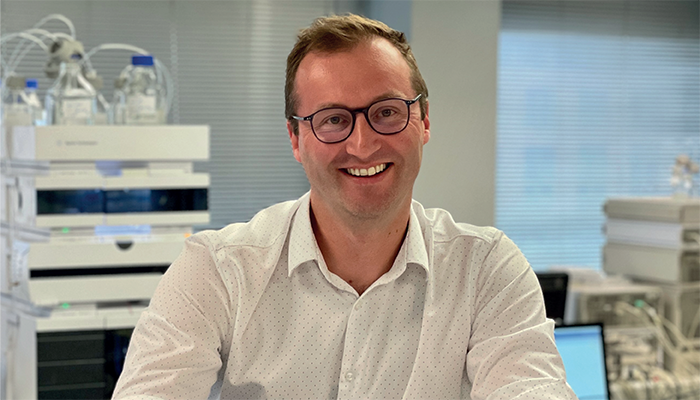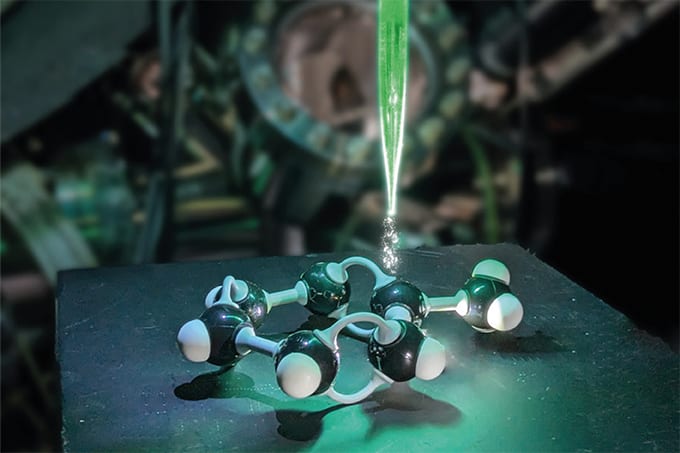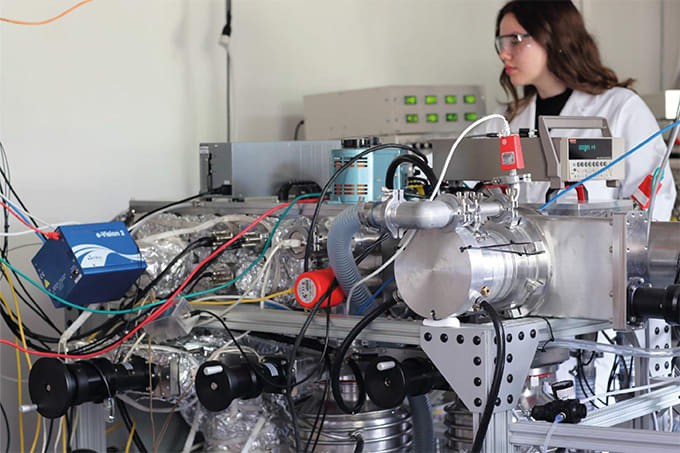Did you always see yourself following in your father’s footsteps?
I was always fascinated by all the old fashioned GC instruments in my father’s garage – where the Research Institute for Chromatography (RIC) started. But honestly, I never thought of doing anything chemistry related – or getting involved with the company at that time. In fact, as a young boy, I wanted to become a pilot!
I initially studied engineering because that leaves all options open. I finally decided to do a PhD in biochemistry after being encouraged by my professors. Then, I joined a startup company, focusing on biomarker discovery. Eventually, after having become a bit of an entrepreneur in my own right, I ended up joining RIC, bringing something completely new to the mix – a focus on life sciences. I remember my father being very happy to pivot to life sciences – not only from a scientific point of view, but also because we could do it together. My father has always been an ideal sparring partner. He was (and still is) very aware of trends and quickly realized that it was a good domain to go into. In hindsight, it was a no brainer.
How did the shift to life sciences influence the growth and culture of the company?
When I joined, the main goal was to work on metabolomics and lipidomics, since I had a background in biomarker discovery. We steadily began working on those principles and suddenly, we got all these requests from the biopharma industry to characterize their products – and that’s when we really started growing fast.
We’ve gone from employing 10–15 people to a family of 75 in around 10 years. The biopharma domain has been an important driver. Originally, we grew organically – mainly through word-of-mouth recommendations. When you continue to deliver quality, you create a bond with the clients and gain respect – and that has allowed us to continuously grow. But we have to be very careful to preserve our culture – our DNA, which is, I would say, a genuine passion for analytics. That passion guides us and makes us good at what we do – educating people, sharing knowledge, addressing the toughest analytical problems and shaping the analytics of the future. We feel comfortable in our niche, which somehow sits between a company and an academic institute.
What changes have you seen in the biopharma industry over the past 10 years?
A great deal has been happening in biopharma analysis: novel and dedicated reagents and chromatographic columns, multidimensional separations, native mass spectrometry, ion mobility, to name but a few – all allowing us to study biological molecules with ever-greater precision. Instruments have become more highly performant, generating tons of information, which is leading to (and demanding) a huge evolution in data analysis.
However, despite many advances in software algorithms, it is still important to look into the data ourselves. And that's something I always tell people in the lab: “Look at the data – you might be missing a crucial piece of the puzzle! There is always something extra to that human touch.”
How do you see the next decade of biopharma analysis shaping up?
There will be new types of molecules, which we will have to analyze. Proteins will continue to dominate the market, but cell and gene therapies as well as mRNA vaccines and therapeutics are emerging. Given that the analytics here are in a similar state to antibody analytics 20 years ago, we’ll need to drastically sharpen and re-invent the toolbox; a heavy duty that we will for sure take up with enormous enthusiasm, dedication, and pride.
I also think we will see more and more automation – for example in data analysis – and the adoption of artificial intelligence. In fact, both automation and miniaturization will be increasingly important in all sectors – especially in terms of sustainability. Everything needs to be smaller and more efficient – and, fortunately, that’s a trajectory we’re already on.
How ready do you think the science community is to embrace artificial intelligence?
Our field has to follow the artificial intelligence route. I have been surprised to find that some recent chromatography conferences haven’t focused much on AI. Perhaps we are a bit conservative as a community.
You would expect those focusing on the fundamentals to begin figuring out how to incorporate AI. But I think people are still trying to understand what it can do for chromatography. To be honest, it’s not entirely clear to me either! We also have colleagues in the company that are attending meetings and reading papers to see how AI can help.
As a company, we are exploring its application in method development, amongst others, which could mean that we may never have to do any practical work again, or at least keep it to a minimum – perhaps our AI tools will provide all answers in the future! Am I exaggerating? I’m not sure…
You have a team of very experienced people, how do you attract these talented scientists?
It’s hard to find the right people, but our culture, mission and vision as a company certainly guides us in the right direction. We are a family business and we don’t want to see scientists join us for a short period – we want people to become a part of this family and grow with us. We have previously struggled to identify good people to bring into the business, as everyone does these days. It seems inevitable that you hire the wrong people at times, yet sometimes you feel like you have won the lottery. However, we are welcoming more and more young scientists and training is a big focus for us: one of our colleagues is pursuing an industrial PhD within our company, for example. I also believe the relationship we have with our clients helps to promote internal innovation – which is what people come here to do!
What keeps you motivated?
First, I recognize there is no limit to learning – and I am always keen to learn new things, which keeps me focused. At RIC, there is certainly always scope to do that! But the most rewarding part of my job is making a difference in the market and having an actual impact on society. For example, one of our customers recently received FDA approval for a molecule we worked on extensively. I often meet people at events that share how our research has been beneficial for their activities. This direct impact is what drives us to keep doing what we do best. What more do you want than happy coworkers and a smile on your client’s face?
How has your father’s name and legacy influenced your career?
I decided I had to follow my own path and I’m very happy that I could work on completely different areas of science to make a name for myself. If I had worked in gas chromatography – a field where Pat Sandra did pioneering work – it would have been impossible for me to achieve the same things as him. I am pleased and proud that I had the opportunity to explore my own field and grow in that domain.
But it has never been easy to be in this sector. When I started my PhD in biochemistry, I naturally had to apply for funding; when I was awarded funding, I recall someone saying it was only because I was the son of a professor. These are the sorts of comments I’ve heard over the years…
Of course, the older generation may recognize me as “the son of,” but it’s funny – others sometimes ask if he’s “the father of…” Now that he has taken a step away from the company, it is a pity that he’s not able to experience all the wonderful changes here first hand. But he keeps supporting us. And we carry on doing everything with his level of passion. My father is very proud of what my brother and I have achieved with RIC – both as a scientist and a father.





